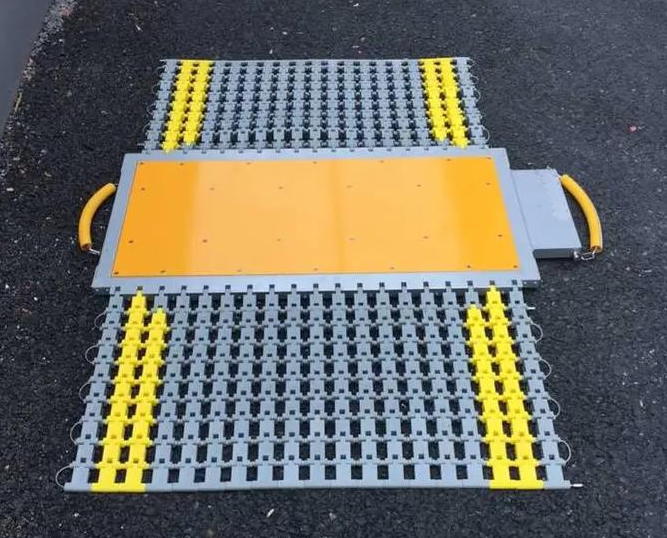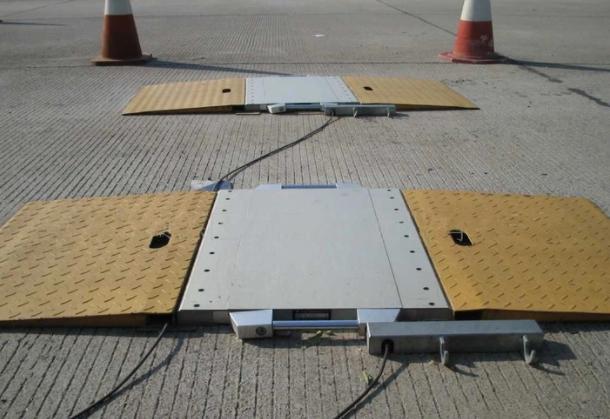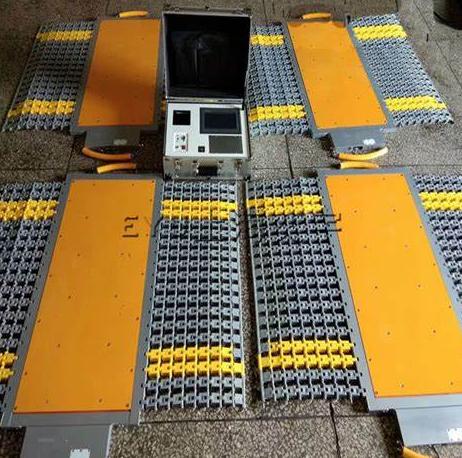Axle Scales: Ensuring Safe and Compliant Transportation on the Road
In the realm of transportation and logistics, axle scales play a crucial role in ensuring safe and compliant movement of goods and vehicles on the road. These specialized weighing devices provide accurate measurements of individual axle weights, helping to prevent overloading, optimize load distribution, and uphold regulatory compliance. In this article, we’ll delve into the fundamentals of axle scales, explore their various types, examine their user base, and provide guidance on choosing the right axle scale for your needs.

What Is an Axle Scale?
An axle scale, also known as an axle load scale or axle weighbridge, is a specialized weighing device designed to measure the weight of individual vehicle axles or wheel groups. Unlike traditional truck scales that weigh the entire vehicle at once, axle scales provide granular weight data, allowing for precise analysis of load distribution and compliance with legal weight limits.
Consisting of a sturdy platform equipped with load cells or sensors, axle scales capture the force exerted by the vehicle’s wheels as it passes over the scale. This technology enables accurate measurement of each axle’s weight, crucial for preventing overloading and reducing wear and tear on road infrastructure.
Axle scales come in various configurations to suit different applications, from static axle scales installed at fixed locations to portable options for temporary weigh stations and construction sites. By facilitating compliance with legal weight limits and promoting load distribution optimization, axle scales contribute to improved road safety, reduced environmental impact, and enhanced operational efficiency in the transportation industry.
What Are the Different Types of Axle Scales?
Axle scales come in various configurations, each tailored to specific applications and operational requirements. Understanding the different types of axle scales can help you choose the right solution for your weighing needs.
- Fixed Axle Scales: Fixed axle scales are stationary weighing platforms installed at fixed locations such as weigh stations, distribution centers, or industrial facilities. Vehicles drive onto the scale, and the weight of each axle is measured individually as the vehicle comes to a stop. Fixed axle scales provide accurate weight measurements and are ideal for permanent installations where vehicles can be weighed as part of routine operations.
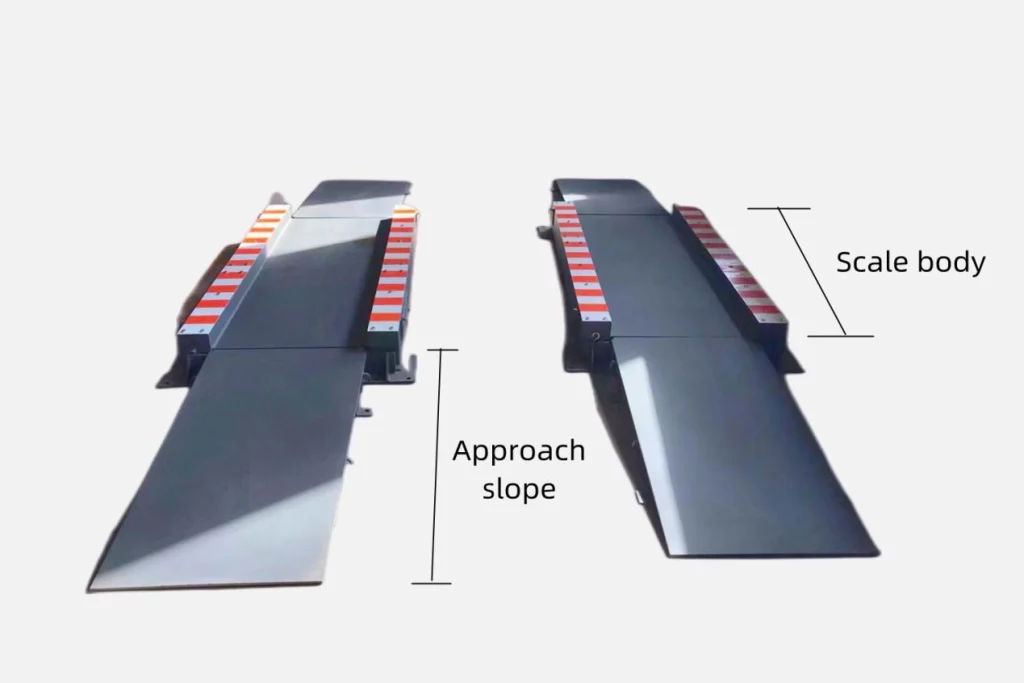
- Portable Axle Scales: Portable axle scales offer flexibility and mobility, allowing weighing operations to be conducted at various locations. These scales are lightweight, compact, and easy to transport, making them suitable for temporary weigh stations, construction sites, agricultural fields, and enforcement checkpoints. Portable axle scales provide accurate weight measurements on the go, enabling rapid deployment and efficient data collection in dynamic environments.

- In-Motion Axle Scales: In-motion axle scales, also known as dynamic axle scales or weigh-in-motion systems, allow vehicles to be weighed without the need to stop. These scales use sensors embedded in the roadway to measure axle weights as vehicles pass over them at normal speeds. In-motion axle scales offer seamless integration into traffic flow, minimizing disruption to operations, and providing real-time weight data for monitoring and enforcement purposes.
- Multi-Axle Weighing Systems: Multi-axle weighing systems are designed to measure the weight of multiple axles or wheel groups simultaneously. These systems can accommodate vehicles with multiple axles, such as trucks, trailers, and buses, providing comprehensive weight data for each axle configuration. Multi-axle weighing systems are versatile and can be configured to suit various vehicle types and sizes, making them suitable for a wide range of applications.
Choosing the right type of axle scale depends on factors such as the intended use, mobility requirements, accuracy needs, and budget considerations. By understanding the different types of axle scales available and their respective advantages, you can select the most suitable solution to meet your specific weighing needs with confidence.
Who Uses Axle Scales?
Axle scales play a critical role in the smooth running of the transportation industry, benefitting a wider range of stakeholders than initially meets the eye. Let’s delve deeper into the various entities that rely on axle scales to ensure safety, efficiency, and fairness on our roads.
Law Enforcement and Weigh Stations
Law enforcement agencies heavily rely on axle scales to enforce weight restrictions on public roads. Overloaded vehicles pose a significant safety hazard, causing excessive wear and tear on infrastructure like bridges and pavements. Axle scales help identify violators, preventing potential road damage and accidents.
Weigh stations, strategically located along highways, are equipped with axle scales to conduct mandatory weight checks on commercial trucks. Here’s how they contribute:
- Safety: By ensuring trucks adhere to weight limits, weigh stations prevent overloaded vehicles from jeopardizing road safety for themselves and other motorists.
- Infrastructure Protection: Weight enforcement protects bridges, roads, and other infrastructure from premature deterioration due to excessive loads.
- Fairness for Law-Abiding Carriers: By cracking down on overweight trucks, weigh stations create a level playing field for responsible carriers who operate within legal limits.
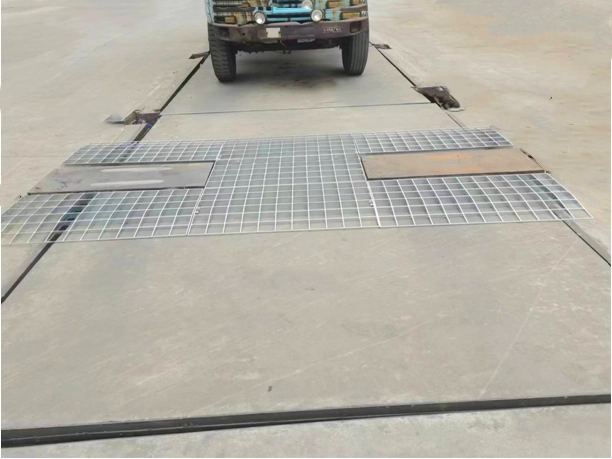
Businesses Big and Small
Beyond law enforcement, a wide range of businesses utilize axle scales to streamline their operations and enhance profitability:
- Transportation and Logistics Companies: Accurate weight data from axle scales allows carriers to optimize loading practices, ensuring they maximize payload capacity while staying within legal limits. This translates to increased efficiency and cost savings.
- Construction Sites: Construction projects often involve transporting large quantities of materials like gravel, concrete, and steel. Axle scales enable contractors to precisely measure incoming and outgoing loads, facilitating accurate material management and cost control. They also ensure proper billing practices for suppliers based on the actual weight of delivered materials.
- Recycling Facilities: Accurate weight measurement is crucial in the recycling industry. Axle scales help recycling facilities precisely determine the weight of incoming recyclables, ensuring fair compensation for suppliers based on the materials they contribute. This transparency builds trust and fosters long-term partnerships within the recycling ecosystem.
- Manufacturing and Production Plants: Many manufacturing facilities utilize axle scales to weigh raw materials, finished products, and outgoing shipments. This data is essential for accurate inventory management, production planning, and ensuring proper billing for shipped goods.
How to Choose the Right Axle Scale?
When selecting an axle scale for your specific needs, consider the following factors:
- Application: Determine the intended use of the axle scale, whether it’s for static weighing at a fixed location, portable weighing at various sites, or dynamic weighing in motion.
- Capacity: Choose an axle scale with sufficient capacity to accommodate the heaviest vehicles in your fleet while allowing room for potential growth and variations in load sizes.
- Accuracy: Look for axle scales equipped with high-quality load cells or sensors capable of providing accurate weight measurements within acceptable tolerances.
- Durability: Opt for axle scales constructed from durable materials and designed to withstand heavy-duty use in harsh environmental conditions, ensuring long-term reliability and performance.
- Portability: If mobility is a priority, consider portable axle scales that are lightweight, compact, and easy to transport, allowing for convenient deployment and use at various locations.
By carefully considering these factors and understanding your specific operational requirements, you can choose the right axle scale to ensure safe, efficient, and compliant transportation on the road.
Conclusion
Axle scales are more than just instruments for law enforcement. They are multifaceted tools that promote safety, efficiency, and environmental responsibility across various sectors. From ensuring safe roads and fair competition in the transportation industry to facilitating accurate inventory management and even contributing to emissions reduction, axle scales play a vital role in keeping our transportation system running smoothly and sustainably.

